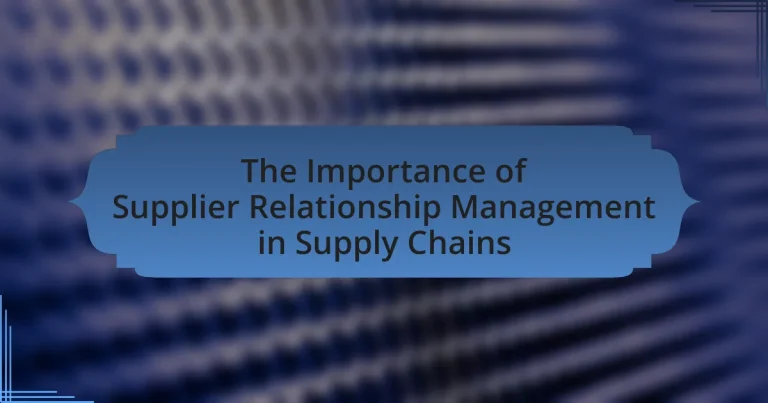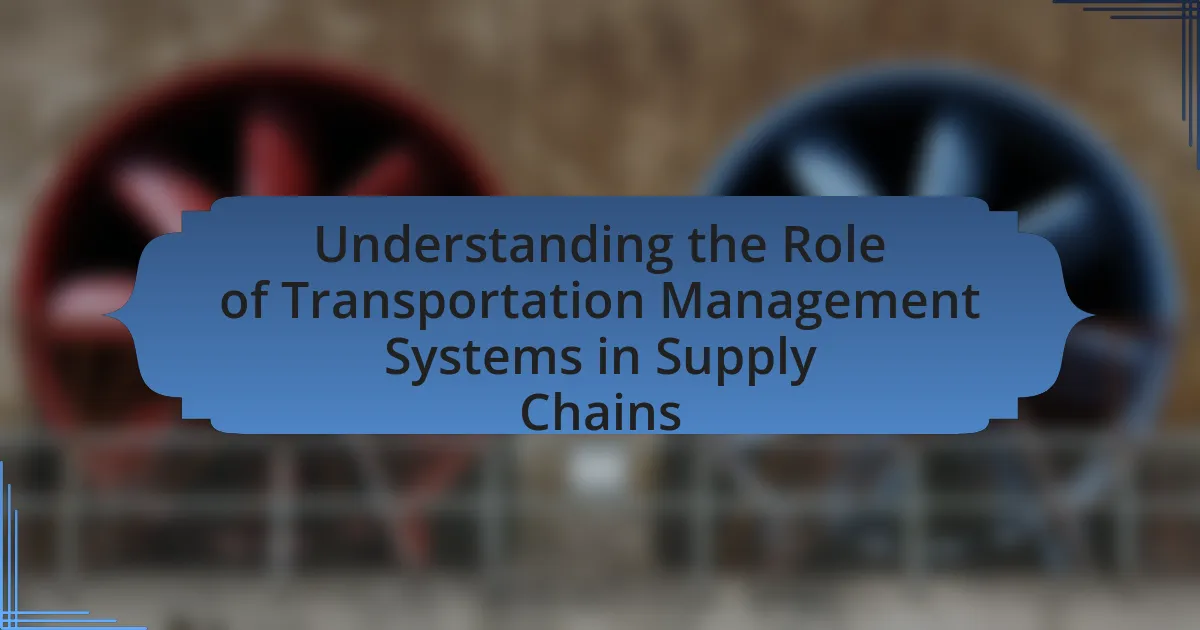Supplier Relationship Management (SRM) is a systematic approach to managing interactions with suppliers to enhance performance and value within supply chains. The article outlines the critical role of SRM in improving supply chain efficiency, reducing costs, and fostering innovation through effective communication, mutual trust, and collaboration. Key elements of successful SRM include performance measurement and joint problem-solving, which contribute to overall supply chain performance and mitigate risks associated with poor supplier relationships. Additionally, the article discusses common challenges organizations face in SRM and best practices to maintain strong supplier partnerships, emphasizing the long-term financial benefits of effective supplier management.
What is Supplier Relationship Management in Supply Chains?
Supplier Relationship Management (SRM) in supply chains refers to the systematic approach of managing and optimizing interactions with suppliers to enhance performance and value. SRM focuses on building long-term partnerships, improving communication, and fostering collaboration to ensure that suppliers meet the needs of the organization effectively. Research indicates that effective SRM can lead to improved supplier performance, reduced costs, and increased innovation, as evidenced by a study published in the Journal of Supply Chain Management, which found that companies with strong SRM practices experienced a 20% increase in supplier performance metrics.
How does Supplier Relationship Management impact supply chain efficiency?
Supplier Relationship Management (SRM) significantly enhances supply chain efficiency by fostering collaboration and communication between organizations and their suppliers. Effective SRM leads to improved supplier performance, which directly impacts the reliability and speed of supply chain operations. For instance, companies that implement robust SRM practices can achieve up to a 20% reduction in procurement costs and a 30% improvement in on-time delivery rates, as evidenced by a study conducted by the Aberdeen Group. This study highlights that organizations with strong SRM capabilities experience better alignment with suppliers, resulting in streamlined processes and reduced lead times.
What are the key elements of effective Supplier Relationship Management?
The key elements of effective Supplier Relationship Management include clear communication, mutual trust, performance measurement, and collaboration. Clear communication ensures that both parties understand expectations and requirements, which minimizes misunderstandings. Mutual trust fosters a strong partnership, encouraging both suppliers and buyers to share information and resources openly. Performance measurement involves assessing supplier performance against agreed-upon metrics, which helps identify areas for improvement and ensures accountability. Collaboration allows for joint problem-solving and innovation, enhancing the overall efficiency and effectiveness of the supply chain. These elements collectively contribute to a more resilient and responsive supply chain, ultimately leading to improved business outcomes.
How do these elements contribute to overall supply chain performance?
Supplier relationship management elements enhance overall supply chain performance by fostering collaboration, improving communication, and optimizing resource allocation. Effective supplier relationships lead to increased reliability and responsiveness, which are critical for meeting customer demands. For instance, a study by the Institute for Supply Management found that companies with strong supplier relationships experience 20% lower supply chain costs and 30% faster delivery times. This demonstrates that well-managed supplier interactions directly correlate with improved efficiency and reduced operational risks in the supply chain.
Why is Supplier Relationship Management critical for businesses?
Supplier Relationship Management (SRM) is critical for businesses because it enhances collaboration and efficiency between companies and their suppliers. Effective SRM leads to improved supply chain performance, reduced costs, and increased innovation. According to a study by the Institute for Supply Management, organizations that actively manage supplier relationships can achieve up to 20% lower procurement costs and 30% faster time-to-market for new products. This demonstrates that strong supplier partnerships not only optimize operational processes but also drive competitive advantage in the marketplace.
What risks are associated with poor Supplier Relationship Management?
Poor Supplier Relationship Management (SRM) can lead to several significant risks, including supply chain disruptions, increased costs, and diminished product quality. Disruptions occur when suppliers fail to meet delivery schedules or quality standards, which can halt production and lead to lost sales. Increased costs arise from the need to find alternative suppliers or expedite shipping, often resulting in higher prices for materials. Additionally, poor relationships can result in a lack of collaboration, leading to subpar product quality and innovation, which ultimately affects customer satisfaction and brand reputation. These risks highlight the critical need for effective SRM to ensure a resilient and efficient supply chain.
How can effective Supplier Relationship Management mitigate these risks?
Effective Supplier Relationship Management (SRM) mitigates risks by fostering collaboration and communication between suppliers and organizations. This proactive approach enables companies to identify potential disruptions early, allowing for timely interventions. For instance, a study by the Institute for Supply Management found that organizations with strong SRM practices experience 50% fewer supply chain disruptions compared to those with weaker relationships. By establishing trust and transparency, effective SRM also enhances problem-solving capabilities, ensuring that both parties can address issues collaboratively, further reducing the likelihood of operational risks.
What are the benefits of effective Supplier Relationship Management?
Effective Supplier Relationship Management (SRM) enhances collaboration, reduces costs, and improves supply chain efficiency. By fostering strong partnerships with suppliers, organizations can achieve better negotiation outcomes, leading to lower prices and improved service levels. Research indicates that companies with effective SRM practices can reduce procurement costs by up to 20% and improve delivery performance by 15%. Additionally, effective SRM facilitates innovation, as suppliers are more likely to share insights and collaborate on new product development when strong relationships are established.
How does Supplier Relationship Management enhance collaboration?
Supplier Relationship Management enhances collaboration by fostering open communication and trust between organizations and their suppliers. This approach allows for the sharing of critical information, aligning goals, and addressing issues proactively, which leads to improved problem-solving and innovation. Research indicates that companies with strong supplier relationships experience a 20% increase in collaboration effectiveness, resulting in better supply chain performance and reduced costs.
What tools and practices facilitate collaboration between suppliers and businesses?
Collaboration between suppliers and businesses is facilitated by tools such as Supplier Relationship Management (SRM) software, cloud-based platforms, and communication tools like Slack or Microsoft Teams. SRM software enables businesses to manage supplier information, track performance, and streamline communication, which enhances transparency and accountability. Cloud-based platforms allow for real-time data sharing and collaboration, ensuring that both parties have access to the same information, which reduces errors and miscommunication. Additionally, effective practices such as regular performance reviews, joint planning sessions, and feedback mechanisms foster a collaborative environment, leading to improved relationships and operational efficiency.
How does improved collaboration affect supply chain outcomes?
Improved collaboration significantly enhances supply chain outcomes by fostering better communication, increasing efficiency, and reducing costs. When stakeholders such as suppliers, manufacturers, and distributors work closely together, they can share critical information in real-time, leading to more accurate demand forecasting and inventory management. According to a study by the Council of Supply Chain Management Professionals, companies that prioritize collaboration in their supply chains can achieve up to a 20% reduction in operational costs and a 30% improvement in service levels. This collaborative approach not only streamlines processes but also builds stronger relationships, which are essential for long-term success in supply chain management.
What role does Supplier Relationship Management play in cost reduction?
Supplier Relationship Management (SRM) plays a crucial role in cost reduction by fostering collaboration and efficiency between organizations and their suppliers. Effective SRM enables businesses to negotiate better pricing, optimize procurement processes, and reduce supply chain risks. For instance, companies that implement robust SRM practices can achieve cost savings of 5% to 15% through improved supplier performance and reduced transaction costs. Additionally, strong relationships with suppliers often lead to innovations and value-added services that further drive down costs.
How can businesses leverage Supplier Relationship Management to negotiate better terms?
Businesses can leverage Supplier Relationship Management (SRM) to negotiate better terms by fostering collaborative relationships with suppliers, which enhances trust and communication. By implementing SRM practices, companies can gain insights into supplier capabilities and market conditions, allowing them to identify opportunities for cost savings and improved service levels. For instance, research by the Institute for Supply Management indicates that organizations with strong SRM practices can achieve up to 20% cost reductions through better negotiation outcomes and strategic partnerships. This data underscores the effectiveness of SRM in creating a competitive advantage in negotiations.
What are the long-term financial benefits of maintaining strong supplier relationships?
Maintaining strong supplier relationships leads to long-term financial benefits such as cost savings, improved quality, and enhanced innovation. Cost savings arise from negotiated discounts and favorable payment terms, which can significantly reduce procurement expenses. Improved quality results from better communication and collaboration, leading to fewer defects and lower warranty costs. Enhanced innovation occurs as suppliers become partners in product development, providing insights that can lead to new offerings and market advantages. According to a study by the Institute for Supply Management, organizations with strong supplier relationships report 20% lower costs and 30% higher quality levels compared to those with weaker ties.
What challenges do organizations face in Supplier Relationship Management?
Organizations face several challenges in Supplier Relationship Management, including communication barriers, lack of trust, and performance measurement difficulties. Communication barriers can lead to misunderstandings and misalignment of goals, which negatively impact collaboration. A lack of trust between organizations and suppliers can hinder effective partnerships, resulting in reduced information sharing and increased risk. Additionally, measuring supplier performance accurately is often complicated due to the absence of standardized metrics, making it difficult for organizations to assess supplier contributions and identify areas for improvement. These challenges can ultimately affect the efficiency and effectiveness of supply chain operations.
How can communication barriers affect Supplier Relationship Management?
Communication barriers can significantly hinder Supplier Relationship Management by creating misunderstandings and reducing collaboration. When suppliers and organizations fail to communicate effectively, it can lead to misaligned expectations, delayed responses, and ultimately, a breakdown in trust. For instance, a study by the Institute for Supply Management found that 70% of supply chain disruptions are linked to poor communication. This statistic underscores the critical role that clear communication plays in maintaining strong supplier relationships, as it directly impacts the efficiency and reliability of supply chain operations.
What strategies can be implemented to overcome communication challenges?
To overcome communication challenges in supplier relationship management, organizations can implement strategies such as establishing clear communication protocols, utilizing technology for real-time updates, and fostering a culture of open dialogue. Clear communication protocols ensure that all parties understand expectations and responsibilities, reducing misunderstandings. Utilizing technology, such as collaborative platforms and project management tools, facilitates real-time updates and information sharing, which is crucial in dynamic supply chain environments. Fostering a culture of open dialogue encourages feedback and proactive problem-solving, which enhances relationships and mitigates potential conflicts. These strategies are supported by research indicating that effective communication significantly improves supplier performance and collaboration, as highlighted in studies on supply chain management.
How does technology play a role in improving communication with suppliers?
Technology significantly enhances communication with suppliers by facilitating real-time information sharing and streamlining processes. Tools such as cloud-based platforms and communication software enable instant messaging, video conferencing, and document sharing, which reduce delays and misunderstandings. For instance, a study by McKinsey & Company found that companies leveraging digital tools for supplier communication experienced a 20% increase in efficiency and a 30% reduction in lead times. This demonstrates that technology not only improves the speed of communication but also fosters stronger relationships through transparency and collaboration.
What are the common pitfalls in Supplier Relationship Management?
Common pitfalls in Supplier Relationship Management include lack of communication, insufficient performance metrics, and failure to align goals. Lack of communication can lead to misunderstandings and unmet expectations, which negatively impact collaboration. Insufficient performance metrics prevent organizations from accurately assessing supplier performance, resulting in missed opportunities for improvement. Failure to align goals between the supplier and the organization can create conflicts and hinder the development of a mutually beneficial relationship. These pitfalls can ultimately compromise the effectiveness of the supply chain and reduce overall operational efficiency.
How can organizations identify and avoid these pitfalls?
Organizations can identify and avoid pitfalls in supplier relationship management by implementing regular performance assessments and fostering open communication. Regular evaluations of supplier performance against key performance indicators (KPIs) enable organizations to pinpoint areas of concern early. Additionally, establishing transparent communication channels encourages feedback and collaboration, which can help address issues before they escalate. Research indicates that companies with strong supplier relationships experience 20% higher profitability, highlighting the importance of proactive management in avoiding potential pitfalls.
What best practices can be adopted to ensure successful Supplier Relationship Management?
To ensure successful Supplier Relationship Management, organizations should adopt practices such as establishing clear communication channels, fostering collaboration, and implementing performance metrics. Clear communication channels facilitate transparency and trust, which are essential for effective partnerships. Fostering collaboration encourages joint problem-solving and innovation, leading to improved outcomes for both parties. Implementing performance metrics allows organizations to assess supplier performance objectively, ensuring alignment with business goals. According to a study by the Institute for Supply Management, effective Supplier Relationship Management can lead to a 20% reduction in costs and a 30% improvement in service levels, highlighting the tangible benefits of these best practices.
What are the best practices for effective Supplier Relationship Management?
The best practices for effective Supplier Relationship Management include establishing clear communication, fostering collaboration, and implementing performance metrics. Clear communication ensures that both parties understand expectations and requirements, which reduces misunderstandings and enhances efficiency. Fostering collaboration involves working together on problem-solving and innovation, which can lead to improved products and services. Implementing performance metrics allows organizations to evaluate supplier performance objectively, ensuring accountability and continuous improvement. According to a study by the Institute for Supply Management, companies that actively manage supplier relationships can achieve up to 20% cost savings and improved service levels.
How can organizations measure the success of their Supplier Relationship Management efforts?
Organizations can measure the success of their Supplier Relationship Management efforts through key performance indicators (KPIs) such as supplier performance ratings, cost savings, and compliance rates. By evaluating supplier performance ratings, organizations can assess factors like quality, delivery times, and responsiveness, which directly impact operational efficiency. Cost savings can be quantified by analyzing reductions in procurement costs and improved negotiation outcomes, demonstrating the financial benefits of effective supplier relationships. Compliance rates, including adherence to contractual obligations and regulatory requirements, provide insight into the reliability and trustworthiness of suppliers. These metrics collectively offer a comprehensive view of the effectiveness of Supplier Relationship Management initiatives, enabling organizations to make informed decisions and improvements.
What ongoing strategies should be implemented to maintain strong supplier relationships?
To maintain strong supplier relationships, organizations should implement ongoing communication, collaboration, and performance evaluation strategies. Regular communication fosters transparency and trust, allowing both parties to address issues promptly and share important updates. Collaborative initiatives, such as joint planning and problem-solving, enhance mutual understanding and align goals, which can lead to improved service and innovation. Performance evaluations, including feedback mechanisms and key performance indicators, ensure that suppliers meet expectations and allow for continuous improvement. Research indicates that companies with effective supplier relationship management practices can achieve up to 20% cost savings and improved service levels, demonstrating the tangible benefits of these strategies.




